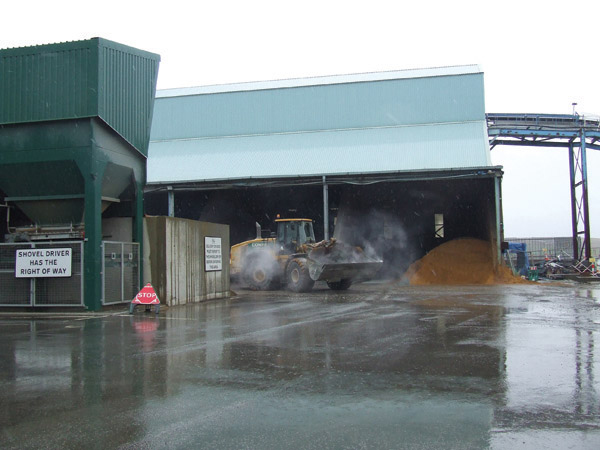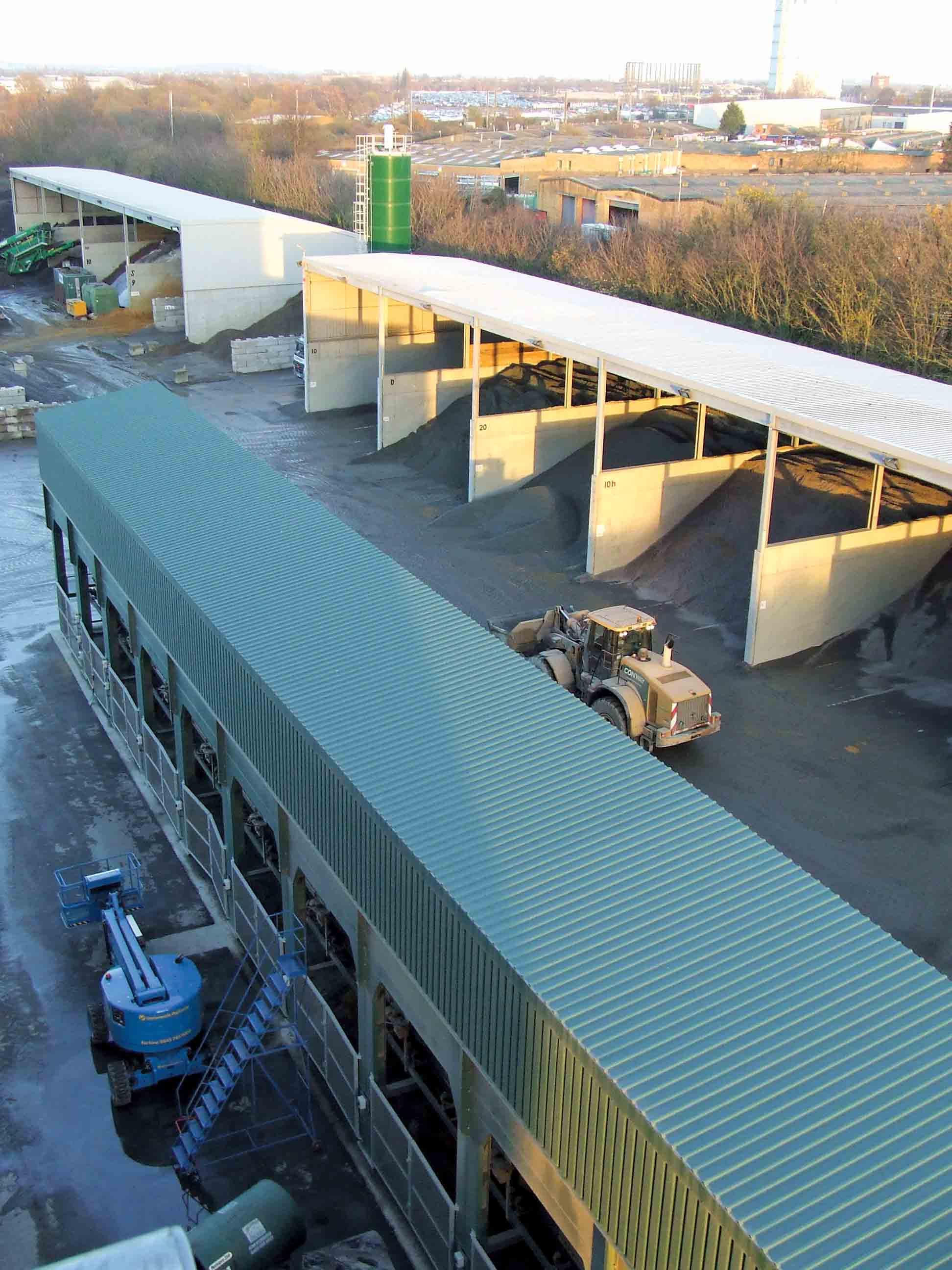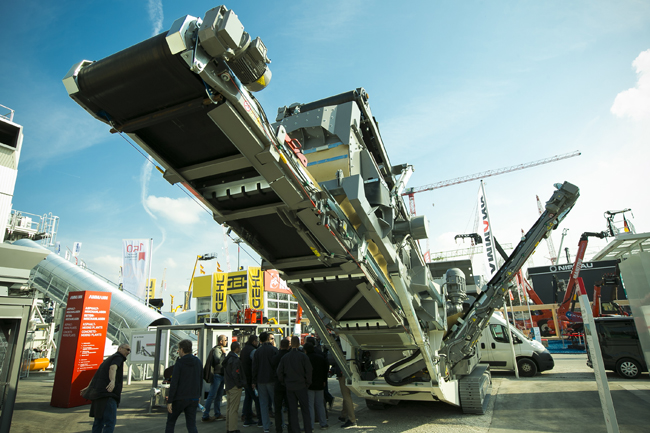A sophisticated Benninghoven asphalt plant is now in use by a UK contractor close to London - Mike Woof writes
UK contractor FM Conway is now operating a second highly advanced asphalt plant in the London area. As with the first unit supplied a few years ago, the plant was designed and constructed to FM Conway’s specific needs by leading producer Benninghoven.
This latest plant is located to the west of London (the earlier plant is to the east of the city) and close to Heathrow Airport. Being situated

The truck loading system allows different vehicles to be filled simultaneously
A sophisticated Benninghoven asphalt plant is now in use by a UK contractor close to London - Mike Woof writes
UK contractor FM2329 Conway is now operating a second highly advanced asphalt plant in the London area. As with the first unit supplied a few years ago, the plant was designed and constructed to FM Conway’s specific needs by leading producer 167 Benninghoven.
This latest plant is located to the west of London (the earlier plant is to the east of the city) and close to Heathrow Airport. Being situated in the vicinity of the M4 motorway means that it has good access to the surrounding area. This last is an important point as it means the facility is easily accessed by asphalt trucks
The plant was installed during 2014 and commissioned at the end of that year and this site represents a sign of FM Conway’s continuing investment in its facilities in the London area. The firm invested in a similarly high specification Benninghoven plant on the eastern side of London at Erith in Kent just a number of years ago, while it also has a new bitumen storage facility at Gravesend on the River Thames. The investment continues and the company intends to have a third asphalt plant up and running in 2017.
The recently commissioned plant near Heathrow is 33m high and has been set up with a sophisticated parallel drum system, one of only five or six such plants operating in the UK. This parallel drum configuration allows the plant to use both new and recycled asphalt feed material, providing both efficient and effective blending for a quality output product.
David Smith is in charge of this FM Conway facility and he explained that a key feature in the firm’s choice of Benninghoven for the plant was the ability of the manufacturer to tailor the equipment specifically to customer needs. Local planning regulations for example capped a maximum height for the plant, which Benninghoven was able to work within by reconfiguring the layout.
FM Conway is a major contractor in the South East of England, carrying out an array of road maintenance, repair and construction work and Smith said, “Around 75% or more of our asphalt is consumed internally.”
The company has an extensive fleet of milling machines which are used on numerous planing jobs around the city and Smith said, “We plane off about 100,000m2/year.
Because of this, FM Conway has a continuous flow of RAP from its many jobsites, with this material then being supplied to the two modern asphalt plants. Monitoring the grade of asphalt being milled is important as this has a major bearing on the quality of the RAP, as well as where it is suited for reuse. Smith said, “We do coring on behalf of authorities and we analyse the material quality before milling.”
The milling work is also carried out so that the high quality wearing course material is planed off separately, so this can be supplied as high grade RAP. A second milling cut will then recover the binder course, for separate storage and use. Smith said, “We know what materials are in the road and we know what we will do with it.”
A sophisticated tracking system is in place to ensure that RAP then being supplied to the firm’s two asphalt plants comes from identified sources. Smith said, “We like to know what we’re going to get. We screen planings and they go straight under cover.”
The design of the plant means that it is able to utilise both hot and cold RAP in the mix. And the facility has been set out with rows of bins for different material grades. These include feed bins that hold the varying sizes of aggregate, as well as those storing RAP, with the latter stored in suitable feed bins for each grade of material. Close to the plant itself, the company also has an extensive storage area where it stockpiles RAP for use later on and material at this site is also classified into separate material grades.
Monitoring the materials coming into the facility is crucial and older stretches of road also yield tar on occasion, which has to be kept separate from the bitumen based RAP. While there are restrictions on the use of tar nowadays, it can be reused in certain instances. However Smith said it is important to know exactly how much tar is recovered, as this requires specific storage.
Once the feed enters the plant for use, variable speed feed motors underneath the feed belts control the incoming flow of material. All of the motors are interlinked and Smith explained that this gives a simple control over the production rate of the plant. Smith explained that there are three bins for RAP for material sizes of up to 6mm, up to 10mm and up to 20mm, “…but we only use two routinely.” He explained that up to 6mm and up to 20mm grades are used most often, with the up to 10mm grade only being used in a small proportion of mixes.
Heating for the plant is supplied by mains gas, which is cost-efficient and also helps minimise plant emissions. Meanwhile the parallel flow drum rotates at 8rpm and is designed to ensure that the cold material and flame effectively move in the same direction. This prevents the flame from meeting the RAP directly, which would impact on the quality of the bitumen.
The plant also meets the strict emissions control requirements of UK planning laws covering urban areas. Despite its high capacity, the facility generates no smell and no dust even at full production. This too was a key factor in FM Conways’ selection of this type of plant. Smith said, “Ducting at the top takes the air and particulates away and recirculates this through the virgin aggregates.”
He continued, “Because of the efficiency we can warm coarse RAP up to 160°C.” And he added that this is a useful feature for producing warm asphalt types.
The feed material is also closely monitored and graded. All fractions are monitored and weighed separately by loadcells. Dried and screened material is then held in hot storage. The virgin aggregate meanwhile is already dry. The virgin aggregate dryer discharges directly into the bottom elevator, while a cyclone is used to separate coarse and fines dust, with filtration then employed in the shape of a fabric filter system. An airflow of some 72,000m3 pulls the airborne dust into the filter, while a pulsed air system then drops the dust into a trough so that an auger can drive the material into filter silos.
The plant’s mixer box is fed by heated RAP as well as cold RAP, while the bitumen weigh kettle provides a precisely metered quantity of bitumen and the facility features twin shaft mixers. There are four bitumen tanks, one of which is a split tank also providing capacity for PMB. The layout of this plant means it can supply special mixes such as coloured materials for bus lanes or cycle lanes. Smith said, “We don’t do a lot but we can if we need to.”
In all the facility represents an investment of some £10 million, although Smith added, “About £3 million of that was for civils work.”
The majority of the production is for urban roads and Smith commented, “It has a capacity of 100,000tonnes/year.”
UK contractor FM
This latest plant is located to the west of London (the earlier plant is to the east of the city) and close to Heathrow Airport. Being situated in the vicinity of the M4 motorway means that it has good access to the surrounding area. This last is an important point as it means the facility is easily accessed by asphalt trucks
The plant was installed during 2014 and commissioned at the end of that year and this site represents a sign of FM Conway’s continuing investment in its facilities in the London area. The firm invested in a similarly high specification Benninghoven plant on the eastern side of London at Erith in Kent just a number of years ago, while it also has a new bitumen storage facility at Gravesend on the River Thames. The investment continues and the company intends to have a third asphalt plant up and running in 2017.
The recently commissioned plant near Heathrow is 33m high and has been set up with a sophisticated parallel drum system, one of only five or six such plants operating in the UK. This parallel drum configuration allows the plant to use both new and recycled asphalt feed material, providing both efficient and effective blending for a quality output product.
David Smith is in charge of this FM Conway facility and he explained that a key feature in the firm’s choice of Benninghoven for the plant was the ability of the manufacturer to tailor the equipment specifically to customer needs. Local planning regulations for example capped a maximum height for the plant, which Benninghoven was able to work within by reconfiguring the layout.
FM Conway is a major contractor in the South East of England, carrying out an array of road maintenance, repair and construction work and Smith said, “Around 75% or more of our asphalt is consumed internally.”
The company has an extensive fleet of milling machines which are used on numerous planing jobs around the city and Smith said, “We plane off about 100,000m2/year.
Because of this, FM Conway has a continuous flow of RAP from its many jobsites, with this material then being supplied to the two modern asphalt plants. Monitoring the grade of asphalt being milled is important as this has a major bearing on the quality of the RAP, as well as where it is suited for reuse. Smith said, “We do coring on behalf of authorities and we analyse the material quality before milling.”
The milling work is also carried out so that the high quality wearing course material is planed off separately, so this can be supplied as high grade RAP. A second milling cut will then recover the binder course, for separate storage and use. Smith said, “We know what materials are in the road and we know what we will do with it.”
A sophisticated tracking system is in place to ensure that RAP then being supplied to the firm’s two asphalt plants comes from identified sources. Smith said, “We like to know what we’re going to get. We screen planings and they go straight under cover.”
The design of the plant means that it is able to utilise both hot and cold RAP in the mix. And the facility has been set out with rows of bins for different material grades. These include feed bins that hold the varying sizes of aggregate, as well as those storing RAP, with the latter stored in suitable feed bins for each grade of material. Close to the plant itself, the company also has an extensive storage area where it stockpiles RAP for use later on and material at this site is also classified into separate material grades.
Monitoring the materials coming into the facility is crucial and older stretches of road also yield tar on occasion, which has to be kept separate from the bitumen based RAP. While there are restrictions on the use of tar nowadays, it can be reused in certain instances. However Smith said it is important to know exactly how much tar is recovered, as this requires specific storage.
Once the feed enters the plant for use, variable speed feed motors underneath the feed belts control the incoming flow of material. All of the motors are interlinked and Smith explained that this gives a simple control over the production rate of the plant. Smith explained that there are three bins for RAP for material sizes of up to 6mm, up to 10mm and up to 20mm, “…but we only use two routinely.” He explained that up to 6mm and up to 20mm grades are used most often, with the up to 10mm grade only being used in a small proportion of mixes.
Heating for the plant is supplied by mains gas, which is cost-efficient and also helps minimise plant emissions. Meanwhile the parallel flow drum rotates at 8rpm and is designed to ensure that the cold material and flame effectively move in the same direction. This prevents the flame from meeting the RAP directly, which would impact on the quality of the bitumen.
The plant also meets the strict emissions control requirements of UK planning laws covering urban areas. Despite its high capacity, the facility generates no smell and no dust even at full production. This too was a key factor in FM Conways’ selection of this type of plant. Smith said, “Ducting at the top takes the air and particulates away and recirculates this through the virgin aggregates.”
He continued, “Because of the efficiency we can warm coarse RAP up to 160°C.” And he added that this is a useful feature for producing warm asphalt types.
The feed material is also closely monitored and graded. All fractions are monitored and weighed separately by loadcells. Dried and screened material is then held in hot storage. The virgin aggregate meanwhile is already dry. The virgin aggregate dryer discharges directly into the bottom elevator, while a cyclone is used to separate coarse and fines dust, with filtration then employed in the shape of a fabric filter system. An airflow of some 72,000m3 pulls the airborne dust into the filter, while a pulsed air system then drops the dust into a trough so that an auger can drive the material into filter silos.
The plant’s mixer box is fed by heated RAP as well as cold RAP, while the bitumen weigh kettle provides a precisely metered quantity of bitumen and the facility features twin shaft mixers. There are four bitumen tanks, one of which is a split tank also providing capacity for PMB. The layout of this plant means it can supply special mixes such as coloured materials for bus lanes or cycle lanes. Smith said, “We don’t do a lot but we can if we need to.”
In all the facility represents an investment of some £10 million, although Smith added, “About £3 million of that was for civils work.”
The majority of the production is for urban roads and Smith commented, “It has a capacity of 100,000tonnes/year.”












